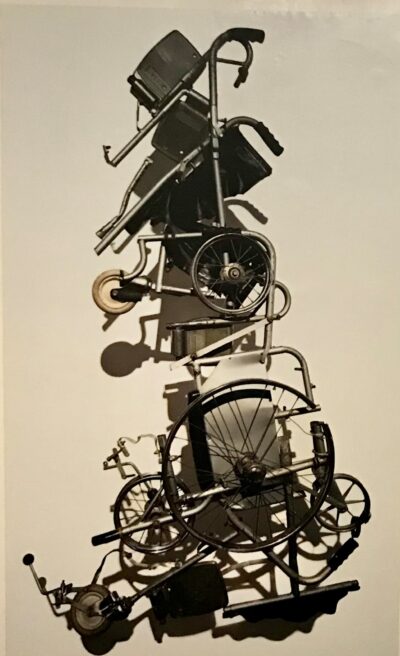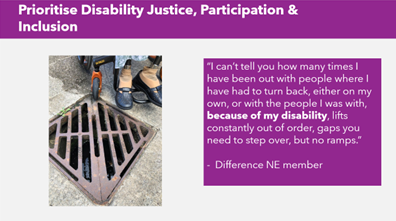North East Mayoral Combined Authority: A chance to do things better.
Ahead of the North East Combined Authority elections for a new regional mayor in May 2024, we have some important points to raise. See below for our Disability Devolution manifesto, which outlines what Disabled people in the North East need for a fair and equal region to live, work and play.
Read the Disability Devolution NEMCA Manifesto
You can access an Easy Read explainer of what NEMCA is here: What is NEMCA? Easy Read
Update February 2024
We have spoken to 3 of the mayoral candidates, with one more scheduled in for March 4th at 10am with the Liberal Democrat Candidate. You can read about what each of them said about how they will make life better for Disabled people in the North East here. What will the NEMCA Mayor do for disabled people in the North East?
What are we saying?
At Difference NE, we work for ALL Disabled people and don’t differentiate by impairment. As such when we talk about Disabled people, we are talking about disabled people from across our entire citizenship. We take an intersectional approach and know that we cannot think about the lived experience of disabled people as a homogenous group. Disabled people have worse outcomes to non-disabled people across the board, including being more likely to live in poverty and less likely to be in education or employment. We know that if you are Disabled AND marginalised in other ways, that you’re more negatively impacted. Then if you live in the North East, data shows that your outcomes are worse still.
What do we need?
We can’t think about policy and infrastructure planning in isolation from accessibility and inclusion. Otherwise access and inclusion becomes, dangerously, merely a tick box on an equality diversity and inclusion checklist, or worse, an equality impact assessment done at the end of plans already made. We advocate for taking a rights-based and disability-justice-led approaches. So, disability justice is imperative to the PROCESS of creating inclusive policy and strategy, and not simply some hopeful outcome, implemented and devised by those with little experience of the kinds of barriers Disabled people face in getting around.
We must follow an approach that acknowledges the intersections and interrelations of barriers and enablers to Disabled people being able to claim our economic, social, and cultural rights. For example, the right to a quality of living that gets better over time.
We think there are 3 policy moves that would make a difference for Disabled people in the North East
- Knowledge: understanding the needs of Disabled people
- Including Disabled people in decision-making about how best that will work, and
- Prioritising disability justice, inclusion and participation as the outcome and driver of strategy, and not something that needs to be ameliorated or is seen as an appendage.
‘Nothing about us without us’
We need Transformational Change
Accessible information and systems. Addressing dangerous attitudinal and social barriers where Disabled people are seen as people to pity, ignore or ridicule. For example, we talk about mobility justice over ‘better transport strategy’ , meaning there is a duty to provide transport that everybody can use, and we link this to health outcomes and further negative financial impact for example.
But we often feel like a broken record in talking about barriers and problems,. What we need is transformational change where social inclusion is prioritised and where we can tackle disablist policy making. Disabled families are far more likely to live in poverty which means that a disconnected and unaffordable transport system poses a host of knock-on barriers that disable us in our education, health, financial wellbeing and so on.

The problems are wide ranging and not including Disabled people in decision making from the beginning means we will continue to get it wrong.
When we prioritise social and disability justice and not simply focus planning and policy on the performance of systems and ways to improve them, we can vastly improve life for Disabled people.
Being able to access an inclusive transport network, green space, accessible education: impacts our ability to work, care for each other and ourselves, and exercise our rights. We have the highest rate of disability in the UK here in the north east. Not being able to participate is never ‘because of our disabilities’ but because of inaccessible and disabling policies and systems.
To keep up to date and for getting involved, join us as a member.
Image credit: Great Britain from a Wheelchair by artist Tony Heaton 1994. It is a a map of Britain made from parts of two NHS wheelchairs.
Image description: Wall mounted sculpture, measuring 1,650mm x 1,000mm, in the shape of the map of Great Britain. It is made from the parts of two grey NHS wheelchairs.

